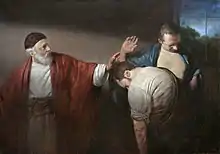
The Parable of the Two Sons is a parable told by Jesus in the New Testament, found in Matthew (Matthew 21:28–32). It contrasts the tax collectors and prostitutes who accepted the message taught by John the Baptist with the ostensibly religious people who did not.
Summary
There is a man who has 2 sons. He comes to the pair individually & he asks them both to go out to work in his vineyard that day. The first son refused to do it at first, but then he did it anyway. As for the other one, he initially said he would do it; but then they didn't do it like he said they would.
Narrative in Matthew's Gospel
In the Gospel of Matthew, the parable is as follows:
“But what think ye? A certain man had two sons. He came to the first & said, ‘Son, go work today in my vineyard.’ “ He answered 'I will not'. But later, he changed his mind & went. “He came to the second & said likewise. He answered & said, ‘I am going, sir’, but he did not go. “Whether of them twain did the will of his father?” They said unto him "The first". Jesus said to them, “Verily I say unto you, the publicans & the harlots are entering the kingdom of God ahead of you. For John came to you to show you the way of righteousness, & you did not believe him, but the tax collectors & the prostitutes did. And even after you saw this, you did not repent and believe him. Matthew 21:28-32
Interpretation
In this parable, Jesus reproved those who considered themselves virtuous; whereas those whom they considered sinners, such as the tax collectors and prostitutes, were accepting the message of John the Baptist and repenting. The parable of the Pharisee and the Publican has a similar theme.

Cornelius a Lapide, in his great commentary, writes that "this parable scarcely needs an explanation, because Christ applies and explains it. In truth, the first son—the one who said he wouldn't do it, but then did it anyway—denotes the publicans and harlots; who at first by their sins repelled the will and law of God, but afterwards by John’s preaching came to a better mind, and did penance, and lived chastely and justly, according to the law of God. On the other hand, the second son— the one who said that he'd go do it, but then didn't—denotes the Scribes and Pharisees; who always had the law of God in their mouths (as though they were most zealous and religious observers of it), but did not fulfill it in their deeds, but by lust, rapine, and usury acted contrary to it. Wherefore they provoked the heavy displeasure and anger of God against them, as well on account of their wickedness itself as because of their hypocrisy and feigned observance of the Law. For such hypocrisy and duplicity grievously provokes God."[1]
References
- ↑ Lapide, Cornelius (1889). The great commentary of Cornelius à Lapide. Translated by Thomas Wimberly Mossman. London: John Hodges.